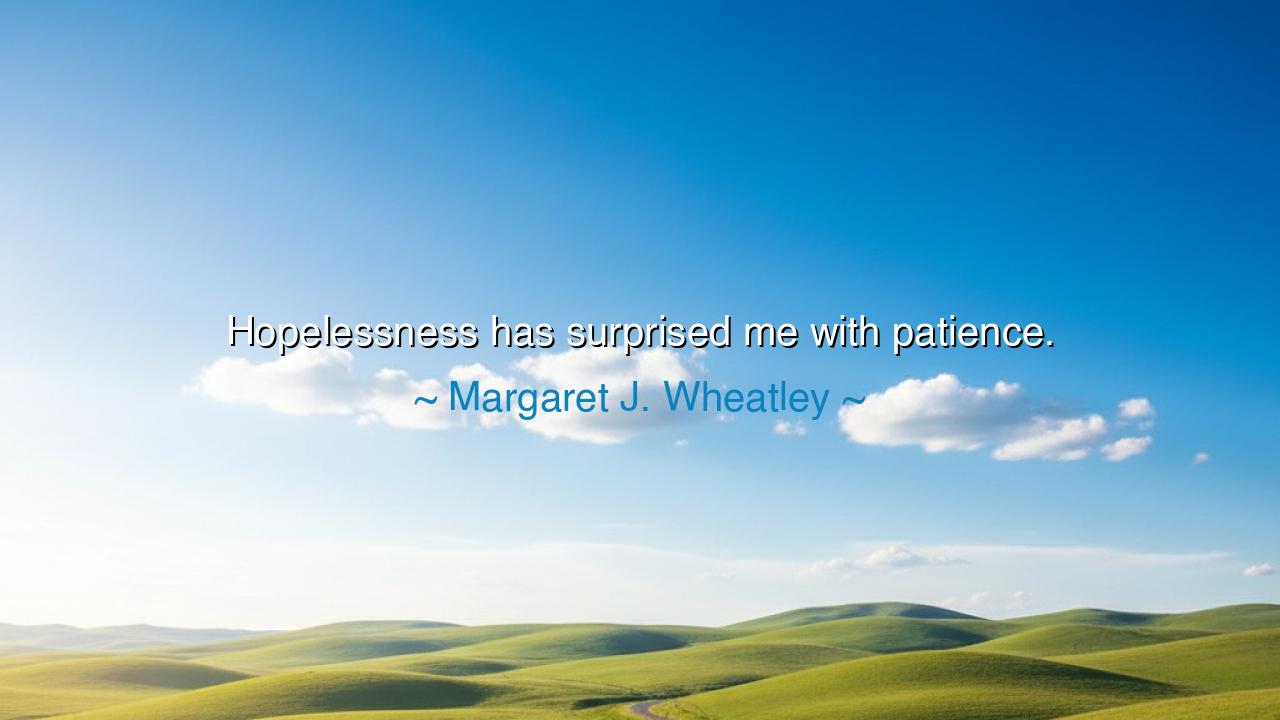
Hopelessness has surprised me with patience.






Hear the solemn words of Margaret J. Wheatley: “Hopelessness has surprised me with patience.” This short utterance is heavy with paradox, yet it rings with a truth that belongs not to one age, but to all. She tells us that when hope seems stripped away, when no bright vision lies ahead to urge us onward, there emerges a deeper kind of endurance—the quiet patience that allows the soul to remain, to breathe, and to continue even without the promise of reward. What she reveals is that despair, though feared, can sometimes give birth to strength that hope itself cannot summon.
When she speaks of hopelessness, she does not mean mere despair, a collapse into nothingness. Rather, she names the moment when our illusions of control are shattered, when the future will not bend to our desires, when we see clearly that not everything can be shaped by our will. And in that moment, stripped of striving, a strange calm may arise. For when we cease clinging to what must be, we discover the ability to wait upon what is. It is this waiting—this patience—that Wheatley calls the surprise gift of hopelessness.
History gives us many witnesses to this truth. Consider the long imprisonment of Nelson Mandela. For decades he sat behind bars, with little reason to believe he would ever again walk freely upon the earth. Many in his place would have surrendered to bitterness or despair. Yet in that hopelessness, Mandela found a profound patience, a strength to endure each day, to listen, to learn, to prepare quietly for a destiny he could not yet see. And when the hour of freedom finally came, his patience became the foundation of reconciliation and renewal for his nation.
This paradox is also echoed in the writings of the Stoics. They taught that when one accepts the limits of human power—when one abandons the false hope of controlling fate—there arises a serenity beyond fear. Epictetus, once a slave, proclaimed that while we cannot control the world, we can master our response. And that mastery, born not from ambition but from relinquishing ambition, is the deepest form of patience. Thus Wheatley’s words stand in a long lineage of wisdom: that sometimes hopelessness is not the end, but the doorway into endurance.
The meaning of her words is both humbling and liberating. We are taught to cling to hope at all costs, yet in doing so we often grow restless, anxious, and impatient when hope does not bear fruit. But when we accept hopelessness, when we no longer demand that tomorrow be what we imagine, we free ourselves to live fully in the present. In that surrender, patience blossoms. It is the patience of the earth, which does not hurry the seasons; the patience of the stars, which burn for ages without striving.
The lesson is this: do not fear hopelessness when it comes. Do not mistake it for the death of the spirit. Instead, listen to what it has to teach. In its silence, you may discover the gift of stillness, of waiting without demand, of enduring without breaking. Where hope drives us forward in haste, hopelessness may anchor us in depth. And often, the deepest transformations of life occur not in the rush of hope, but in the slow unfolding of patience.
Practical action follows: when you face a time when hope is gone, do not collapse into despair, nor force yourself into false optimism. Instead, breathe, and let patience arise. Accept the moment as it is, without demand that it change quickly. Trust that even in hopelessness, life continues to work within you, shaping strength unseen. Walk slowly, endure quietly, and wait faithfully. For as Wheatley discovered, hopelessness, though bitter, can become a hidden teacher, surprising you with the strength of patience.
Thus her words endure as a lantern for those lost in the dark: “Hopelessness has surprised me with patience.” Remember this, O listener—when hope fails, something deeper may yet sustain you. Do not fear the silence of despair, for within it often dwells the quiet power to endure, and in endurance lies the seed of rebirth. Patience is the hidden gift that hopelessness gives.






AAdministratorAdministrator
Welcome, honored guests. Please leave a comment, we will respond soon